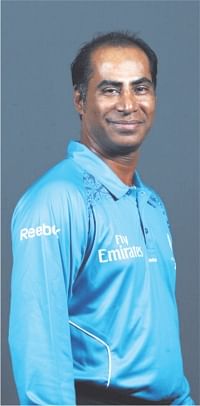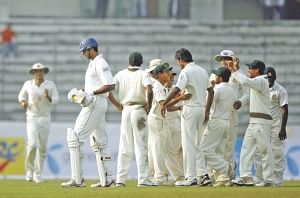| Home - Back Issues - The Team - Contact Us |
 |
| Volume 11 |Issue 03| January 20, 2012 | |
|
|
Achievement The One Man Army Enamul Haque Moni becomes the first ever umpire from Bangladesh summoned by the International Cricket Council to officiate a test match in between two foreign teams Naimul Karim
Browsing by the Rafiques, Razzaks and Shakibs, one often wonders how this trend of slow-left arm bowling first started in Bangladeshi cricket. The answer to that lies with a modest man in his late forties. Living in a quiet corner of Uttara, Enamul Haque, also known as Moni ,who initially started off his career as a fast bowler, changed his style of bowling, during a first class match, in order to adjust to the slow pitched conditions. The transition to slow-left arm bowling did wonders as he became the leading arsenal for the Bangladeshi bowling attack of the nineties. “I remember my captain asking me if I could bowl spin due to the turning pitch. I said yes and got a wicket with my very first delivery,” recalls Haque. By the time the Bangladeshi cricket team battled it out against the associate nations in the ICC trophy and were eventually granted Test Status in 2000, Haque had become an inspiration for the next generation of bowlers. As a result, the art of slow-left arm bowling continues to dominate the Bangladeshi bowling attack. Albeit, we are often guilty of getting over-dependent on them, but nevertheless, we have produced some of the finest. As if inspiring a generation of bowlers wasn't enough, Haque turned towards umpiring after retirement and ever since has become the go-to man for the Bangladeshi Cricket Board's umpiring committee. “On television, it seems like an umpire's duty ends with the last ball of the match, but honestly speaking there is as much work to be done before and after a match,” he explains. His hard work both on and off the field paid off as he became the first ever umpire from Bangladesh summoned by the International Cricket Council to officiate a test match in between two foreign teams. Although Haque's tryst with cricket started as a player, he always had a special interest for the laws of the game and frequently carried a copy of the ICC's umpiring manual to domestic matches. As a student, he used to enjoy being the official scorer of a match. “Back in those days you needed to have a good hand-writing to be a scorer and fortunately my writing was very legible,” he explains. It was therefore only a matter of time before Haque got into the umpiring profession. “The thing I like the most about umpiring is the fact that you have to individually solve the problems of a game. The more critical the situation, the more I enjoy,” he says. Describing his job as highly-regulated, Haque believes that his good performance has compelled the ICC to give him a special opportunity by allowing a non-elite umpire to officiate a neutral test match. “I have been happy with my performance over the last couple of years and overseeing the test match will possibly be the first step to enter the ICC's list of elite umpires,” says Haque. Explaining the nitty-gritty details of the ICC's umpiring review system, Haque claims that an umpire needs to get good reviews from the captains of the two teams, the regional umpire present in the ground and the ICC committee that monitors performances based on video footage. “On the whole, it's a very systematic and thorough process,” claims Haque.
With such a rigid review system, umpires are forced to be on their toes. As a result of which, different umpires have different methods of dealing with close decisions. While majority of the umpires choose to know their mistakes at the post-match briefing, Haque prefers knowing them at the innings break or through instant messages from the third umpire. Stating an example he says, “In the case of no-balls I ask the third umpire to let me know if a player is close to over-stepping the line. If I make a mistake I want to know about it on the spot so that I don't make a similar error in the later stages of the match.” Speaking of mistakes, Haque claims that he has made only three in his entire career, two of which involved Bangladeshi batsmen, a stat that unfortunately lead to his criticism by certain media houses in Dhaka. Criticism though, according to him, is a part and parcel of the game. “ We have to make 20 correct decisions in every match, so there is obviously a lot of pressure, but a part of being an umpire is to be able to handle that pressure,” explains Haque. Thus, in order to make things a lot easier for umpires, Haque believes that the Decision Review System (DRS) should be used by every test playing nation. At the moment though, due to the high expense, the BCB prefers not using it. “Close decisions are bound to take place in a match, so if you have the technology to get an error-free decision then it should be used,” he says. At a time when Bangladeshi cricket is going through a rough patch, especially in the Test arena, the opportunity given to Enamul Haque by the ICC is testament of his good performance and resolute character. From individually inspiring countless number of bowlers in the domestic league to promoting the levels of umpiring in the country, it wouldn't be an exaggeration to say that this is just the beginning of another golden innings from the one-man-army. Copyright (R) thedailystar.net 2012 |

